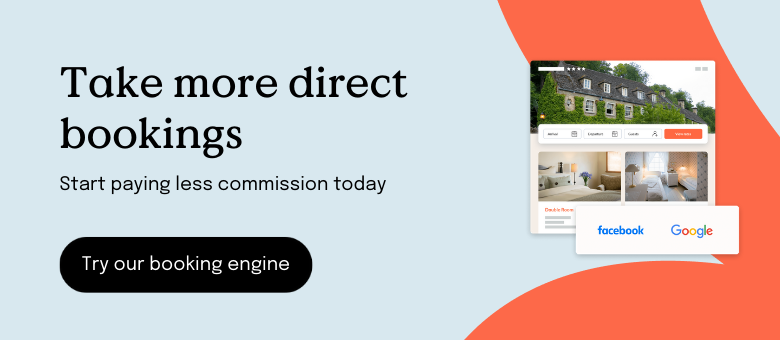What is an integrated booking system?
An integrated booking system is a piece of software that connects your website and your direct booking engine to create a simplified and unified guest booking experience, and to make the job of handling bookings easier for a hotelier.
It is designed to get your website and booking engine working together to drive more bookings of greater value, and to offer a simple (and fully branded) experience to your guests.
This blog will tell you everything you need to know about integrated booking systems. Let’s go!

Why is an integrated booking system important for a hotel website?
Boosting direct bookings is essential for the success of your small property. The more you can rely on your own website, the less commission you have to pay to online travel agencies and the stronger your relationship with guests will become.
However it’s not enough to simply have a beautiful website. You also need to give travellers a hassle-free way of completing their booking online from any device. That’s where an integrated booking system comes in. Smooth integration between your website and booking engine is vital for providing a smooth and fast experience for guests as they complete their reservation.
One of the primary reasons for guests to abandon a booking is if the process is slow, clunky, or inconsistent. If the look and feel of your brand doesn’t match, or the two systems aren’t connected, guests may find themselves confused or frustrated.
Another reason to ensure you have seamless integration is so your booking process is on par with the OTAs, which often provide a fast and easy experience for travellers booking online – including those making reservations from their mobile phones.
What are the benefits of integrating a booking system into a hotel website?
The integration of a booking system with your hotel website, and the subsequent ability for your guests to book directly, results in a wealth of compelling benefits. Here are four of the most compelling:
- Generate more revenue: The first and most obvious perk? You don’t have to pay online travel agencies for the pleasure of taking bookings! OTAs generally take a 15-25% cut of the price – money which is far better in your pocket than theirs.
- Price more competitively: The dramatic savings that come with removing the OTA middleman mean that you can make more money while simultaneously charging your guests less! When you price your hotel more aggressively, you’ll enjoy more bookings.
- Enjoy greater control: You have total control over your integrated booking system. You can sculpt the process in line with your customers’ needs and wants, and unlike relying on the limited guest data often passed on by OTAs, you can get the information you need.
- Establish deeper customer connections: Armed with deeper insights into your customers, and in control of the booking process, you can connect in a deeper and more meaningful way with your guests, then use this knowledge to create a more personalised guest experience.
What to look for in an integrated booking system
An integrated booking system should at least have these six most basic features:
- Work with all website themes, and should be customisable to match your brand
- Be mobile optimised
- Feature large, user-friendly, booking buttons that make it as simple as possible to take action
- Offer secure data entry and is PCI compliant
- Have the ability to integrate with additional systems you may be using, such as a front desk system or channel manager
- Process guest payments smoothly and allow you to get paid quickly
Ways to implement an integrated booking system
There are three options you might consider when choosing to integrate a booking engine with your website:
- Integrating a booking engine with your existing website – via a plug-in or a custom build
- Integrating a booking widget – via code snippet into website’s HTML code
- Host your website with your booking engine provider
1. Connect a hotel booking integration into your existing website
How you integrate a hotel booking tool will depend on the website platform you use. WordPress is the most popular, and the good news is you can easily integrate a booking engine plugin into your WordPress website to begin accepting online bookings from your guests. The difficulty is more in choosing the best booking plugin for your situation. Booking plugins are also available for the Squarespace and Wix website building platforms.
The potential cons of integrating this way are that not all booking engine providers will be able to integrate with your current website, or provide a true two-way integration. So what other options are available?
2. Add a booking system integration through a widget
Hoteliers can also consider adding a booking system integration through a widget via code snippet in the website’s HTML code. Like the WordPress plugins mentioned above, the right widget will need to be secure, compatible, customisable, and easy-to-use.
Finding a third-party widget that ticks all of these can prove a challenging task. It may require a lot of trial and error to find a suitable option – not ideal when you’re dealing with real, paying guests – and indeed there’s no guarantee that the perfect solution exists for your website and business.
3. Host your website with your booking engine provider
Many hotel technology providers offer an all-in-one experience, so you can build your website and integrate a booking engine with the same platform.
Little Hotelier is just one example; offering a website builder that allows you to create a beautiful, customisable, and optimised website in minutes. There’s no need to have any web development experience or pay for additional updates and maintenance.
The benefit of this option is that both features are designed by the same provider, specifically for small properties, making the integration as smooth and effective as possible.
Why not get started with Little Hotelier and integrate your booking engine and website today?

How much does a room booking system integration cost?
If you intend to use your own existing website, you can get started and set up with Little Hotelier basics for less than $40/month.
Not only will you enjoy your integrated booking engine but you’ll also have access to:
- An integrated front desk system
- Up to 5 channel manager connections
- Performance reporting and insights
- Mobile app to manage your property from anywhere
- Full 24-hour support via email and chat
Choose Little Hotelier’s integrated booking system for your hotel website
If you want to use Little Hotelier’s website builder alongside the booking engine, Little Hotelier Pro is for you. You’ll get everything that’s included in basics plus a bunch more including the website builder, additional channel connections, metasearch bookings, competitor rates, and phone support.
But for many hoteliers, the booking engine feature alone will be worth the price of admission, as it grants you the ability to earn more instantly – demonstrated by the fact that it can increase revenue by up to 43%!
- Take bookings from various channels: Create action in moments of aspiration – connect your booking channels and allow guests to book your hotel from Booking.com, Expedia, Airbnb, and more.
- Upsell and cross-sell: Increase your revenue further by offering tempting upgrades and extras during the booking process that guests can add in a click.
- Multiple languages and currencies: Attract guests the world over by allowing them to book in their language and currency.
By Dean Elphick
Dean is the Senior Content Marketing Specialist of Little Hotelier, the all-in-one software solution purpose-built to make the lives of small accommodation providers easier. Dean has made writing and creating content his passion for the entirety of his professional life, which includes more than six years at Little Hotelier. Through content, Dean aims to provide education, inspiration, assistance, and, ultimately, value for small accommodation businesses looking to improve the way they run their operations (and live their life).
Table of contents
“Little Hotelier's mobile app is super useful. I use it daily to keep track of bookings and check my sales. It has certainly made my life easier”
Co-founder, El Samay Hotel Boutique






